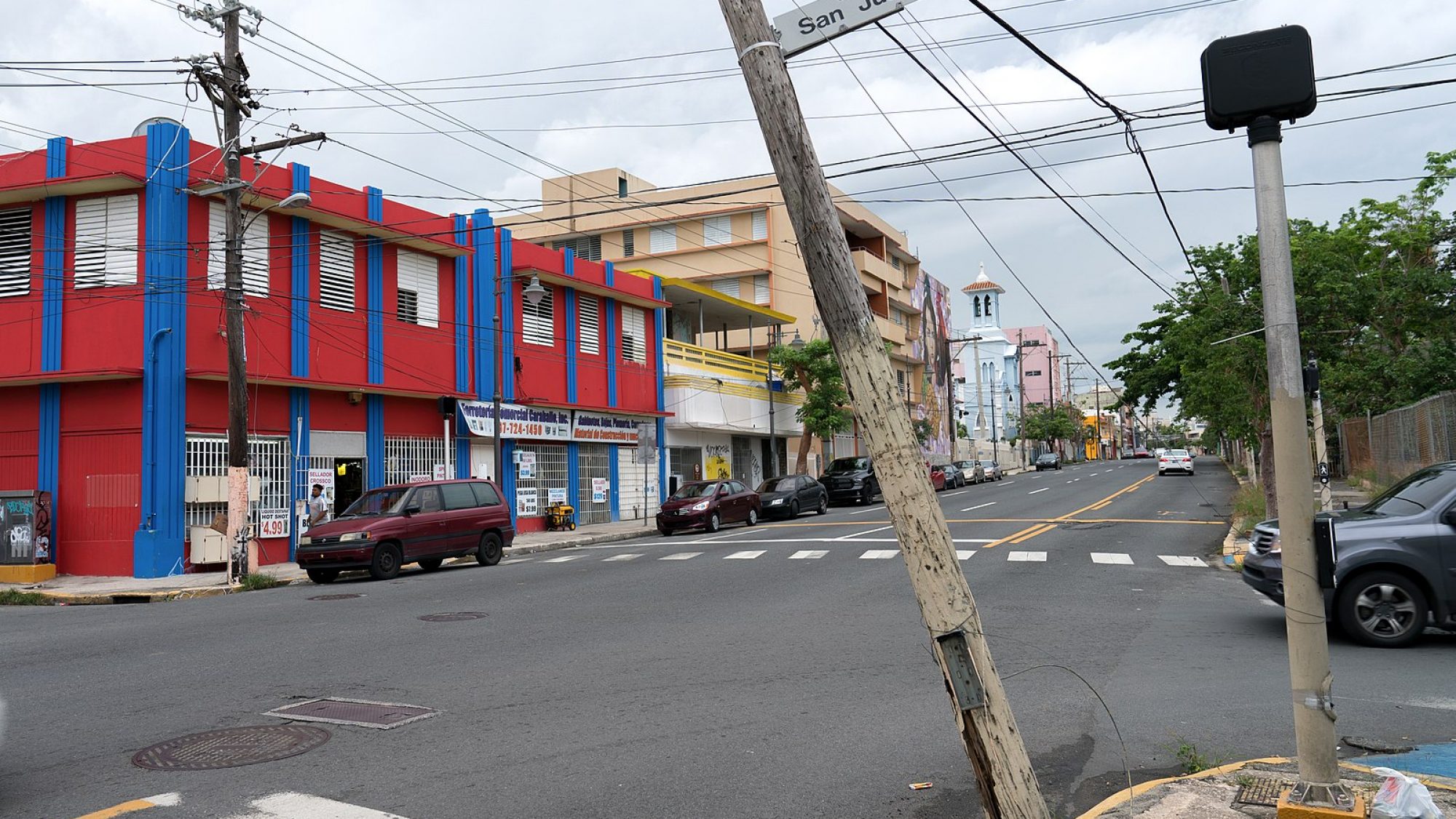
Title: “Fuera LUMA”: Puerto Rico Confronts Neoliberal Electricity System Takeover amid Ongoing Struggles for Self-Determination
This article highlights Puerto Rico’s energy injustices and efforts to upend harmful, traditional forms of power governance that threaten the creation of decarbonized and decentralized power systems that advance self-determination.
Puerto Rican energy studies scholars have argued for years that technological changes cannot be effective without addressing and transforming underlying power inequities. Current unsustainable relationships exist between politicians who align with fossil-fuel and pro-development corporate officials and everyday people who are forced to finance these harmful business agreements. While reducing, and ultimately ending, imported fossil fuel reliance is key for implementing alternatives to unsustainable electric power infrastructure and fuel sources, this major change also requires deconstructing a top-down, corrupt governance system. Enacting energy justice in Puerto Rico requires that residents envision and guide their own electric energy present and future. This form of people power counters neoliberal privatization plans and necessitates that policymaking and policy implementation serve the interests of civil society. This social transformation is especially important for low-income and -wealth, rural, and Afro-descendant communities that often are most harmed by Puerto Rico’s electricity grid that centralizes, rather than distributes, electricity and other forms of power.
Like other small island nations around the world, Puerto Rico, a US colonial territory, faces staggering climatic and economic hardships. Climate hazards, such as rising sea-levels, already affect coastal and low-lying regions and threaten to displace thousands of families in the archipelago’s most marginalized communities. These anthropogenic climate-related threats, including stronger and more dangerous hurricanes, are also increasingly common. The September 2017 consecutive blasts of Hurricanes Irma and María exemplify the devastating and often lethal consequences of such climate chaos. Researchers predict that these disruptive events will continue and intensify in the coming years. Ninety-seven percent of Puerto Rico’s electricity is produced by imported fossil fuels, and agreements to increase reliance on methane gas marks a major area for concern. The local governmental agenda to maintain the energy status quo in the face of ongoing and worsening climate disruption and environmental degradation promises to be disastrous for residents in the Caribbean archipelago.
Infrastructural changes that implement renewable energy into the existing grid system will be gravely insufficient if they do not attend to underlying power inequities and corrupt privatization deals that perpetuate an outsider-knows-best mentality. The privatization of public services to benefit wealthy investors, corporate heads, and politicians carries significant consequences for residents living in the archipelago. These effects are a direct result of the Puerto Rico Oversight, Management, and Economic Stability Act (PROMESA), which has enacted suffocating energy, economic, housing, healthcare, and education policies that threaten the wellbeing and survival of local residents. The US Congress voted for this bill in June 2016, and President Barack Obama signed the legislation into law that same month. PROMESA created the Fiscal Control Board, locally known as “the Junta.” This body has enacted draconian cuts to Puerto Rico’s public resources as a “solution” to the colonial territory’s crushing debt burden. The board’s neoliberal agenda is motivated by maximizing profits for capitalist interests via privatization and deregulation. Board members and political appointees are responsible for shutting down hundreds of public schools and hospitals, threatening worker pensions, and supporting privatization efforts to impede urgent investments in improving critical infrastructure, such as roads, water collection and distribution, and electricity. Privatizing public services consistently leads to top-down decisions that are legitimized by fast-tracked “emergency” discourses with cruel agendas. In the case of Puerto Rico, local elites and their corporate cronies lease or sell essential public services to the highest bidder.
The most recent, contentious privatization agreement involves the Puerto Rico Electric Power Authority (PREPA) and LUMA Energy, which is jointly owned by US and Canadian business interests. This public-private “partnership” enacts a colonial-style privatization takeover by foreign companies that further limits Puerto Rican self-determination to exercise power over their electric energy present and future. On June 1, 2021, LUMA took command of Puerto Rico’s transmission and distribution system, customer service, and billing, among other key functions. Despite former claims that the company would prioritize the current positions of PREPA electricians and other employees, many workers face the reality of reapplying for their jobs and possibly being moved to other agencies. Members of the Electrical Industry and Irrigation Workers Union staged several strikes and demonstrations because of LUMA’s disregard for their union rights to collective bargaining. In addition to labor concerns, this fifteen-year agreement requires electricity bill ratepayers in Puerto Rico to finance hundreds of millions of dollars in LUMA’s operating fees, resulting in large billing increases. These excessive charges are coupled with barriers to communicating with LUMA representatives; the company’s website, for instance, crashed in early June 2021. Meanwhile, official LUMA correspondence predominantly is communicated in English, although most residents are Spanish speakers. Adding fuel to these major problems, a substation fire on June 10 caused about 800,000 households to lose power, resulting in large blackouts throughout the archipelago.
Another reason why so many individuals and groups vehemently oppose the LUMA contract is because of the corrupt proposal process. The Puerto Rico Public-Private Partnership Authority suggested that the proposal review committee choose LUMA, and Puerto Rican Governor Pedro Pierluisi, the Fiscal Control Board, and PREPA board members—in consultation with the Puerto Rico Energy Bureau (the local energy regulator)—approved the decision. The proposal process, which was facilitated by Puerto Rico’s status as a US colonial territory, lacked transparency. Closed-door, neoliberal agreements are the norm and are based on long-standing policies and practices that present Puerto Rico as a corporate playground. The selection of LUMA Energy to oversee the power utility’s operations is just one example of corrupt agreements shaping Puerto Rico’s energy politics landscape.
The LUMA privatization deal preserves the dangerous system of relying on imported fossil fuels and long-distance transmission and distribution. This power configuration poses tremendous vulnerability to existing infrastructure when severe storms and earthquakes hit. This precarity is evident from recent climate and environmental disasters: Hurricanes Irma and María decimated the energy transmission and distribution system, and the 2019–2020 earthquakes in southwestern Puerto Rico damaged and temporarily shut down two centralized power facilities that run on imported fossil fuels. Knowing intimately these very high stakes, residents deployed numerous resistance tactics against LUMA’s takeover, including blockading major highways, organizing caravans, and creating encampments. Placards and social media posts included the declarations “Fuera LUMA” (“Get out LUMA”) and “#TodoPuertoRicoContraLUMA” (“All of Puerto Rico against LUMA”).
These movements from below mark a refusal to accept the centralization of political and infrastructural power in the hands of the elite few. A more equitable system necessitates that distributed rooftop solar energy be available to everyone in Puerto Rico, which a 2020 National Renewable Energy Lab study found is more than possible. Residents, including low-to-moderate income households, can benefit from this transition through electricity bill savings and direct engagement with how their electricity system is installed and maintained. Employing an energy justice frame is vital for addressing how electric energy transitions impact the most marginalized people, such as Afro-descendant rural residents of the Jobos Bay. These individuals tend to be the first to lose power and the last to have it restored. The north-to-south transmission and distribution grid enables this uneven power relationship by prioritizing electricity access for the urban areas of San Juan, while devaluing the lives and wellbeing of coastal residents in southern Puerto Rico. Communities in the largest island’s mountainous regions also face disproportionate impacts and marginalization.
Given these inequities, many communities have taken power into their own hands, literally. The Queremos Sol (We Want Sun) Proposal is coauthored by grassroots group organizers, electric union members, and academic researchers, among others. The plan calls for shifting toward distributed energy resources (e.g., rooftop solar), making energy literacy accessible, creating jobs for local community members, and working with local power utilities. This process involves ensuring that PREPA is accountable to everyday people, not only to corporate and political cronies who work to perpetuate heavy reliance on imported fossil fuels and a failed transmission and distribution system. The Queremos Sol Proposal is also complicated by Puerto Rico’s territorial status, which limits self-determination via arbitrary policies and other impositions. Thus, as energy studies scholars in the archipelago and in the United States argue, decolonization must be a part of distributed renewable energy advocacy to transform power in all forms.
Casa Pueblo’s years of laudable efforts in the mountainous community of Adjuntas exemplify this visionary work, as do initiatives rooted in communal self-determination in southeastern Puerto Rico. Grassroots group Iniciativa de Ecodesarrollo de Bahía de Jobos (IDEBAJO, Ecodevelopment Initative of Jobos Bay) enacts a mutual support approach that challenges ongoing pollution and disregard for local lives in and around Jobos Bay. Communities in the Salinas-Guayama region confront disproportionate impacts of a fossil-fuel based economy and environmental racism. According to the Environmental Protection Agency’s Toxic Release Inventory, the two most polluting plants in Puerto Rico are the US-owned Applied Energy Services (AES) coal plant in Guayama and the thermoelectric complex in Aguirre (Salinas). IDEBAJO members and their neighbors suffer from exposure to the noise, air, water, light, and other forms of pollution caused by these facilities. In response, collaborators on one group project, Coquí Solar, installed solar panels on their community center’s roof. IDEBAJO’s latest electricity-related project involves providing free access to solar kits for elderly people and other community members most in need of power. This work is critical for providing residents with electricity during outages to keep medicine chilled and to maintain essential, life-giving resources and technologies, such as oxygen therapy and dialysis. These community designed and guided projects place local residents in charge of their own energy infrastructure, as they deliberate about, install, and maintain solar panels and other equipment. Projects also allow residents to strengthen relationships and share their experiences and knowledge with other communities.
These grassroots organizing efforts and initiatives point to the necessity of transforming powerful technological and social systems. For these major changes in the Puerto Rican archipelago, policy must focus on the experiences and needs of marginalized groups, especially low-income and -wealth, rural, and Afro-descendant communities. The Puerto Rico Energy Bureau should adhere to the Queremos Sol Proposal, which now faces additional obstacles with the privatization of key functions and services of PREPA. Despite this major setback, grassroots mobilizations for an alternative energy present and future tenaciously persist, as frontline communities understand well the life and death stakes of these power(ful) struggles.
. . .
Catalina M. de Onís is an Assistant Professor in the Department of Communication at the University of Colorado Denver. She is the author of Energy Islands: Metaphors of Power, Extractivism, and Justice in Puerto Rico (2021).
Dr. Hilda Lloréns is an Associate Professor of Anthropology & Marine Affairs at the University of Rhode Island. She is the author of Making Livable Worlds: Afro-Puerto Rican Women Building Environmental Justice (2021).
Image Credit: Lorie Shaull, Flickr, Creative Commons License
Recommended Articles

An estimated 7.9 million Venezuelans migrated abroad for the long term under President Nicolás Maduro’s rule as Venezuela’s political, economic, and social crises have deepened. Alongside rising Venezuelan migration, migrants…

Amid stalled U.S. federal climate engagement and intensifying transatlantic climate risks, subnational diplomacy has emerged as a resilient avenue for cooperation. This article proposes a Transatlantic Subnational Resilience Framework (TSRF)…

The 1997 hijab ban in Türkiye left lasting effects on Muslim women’s psychological, social, and religious identities, shaping their experiences across academia, bureaucracy, and politics. Evidence from interviews…